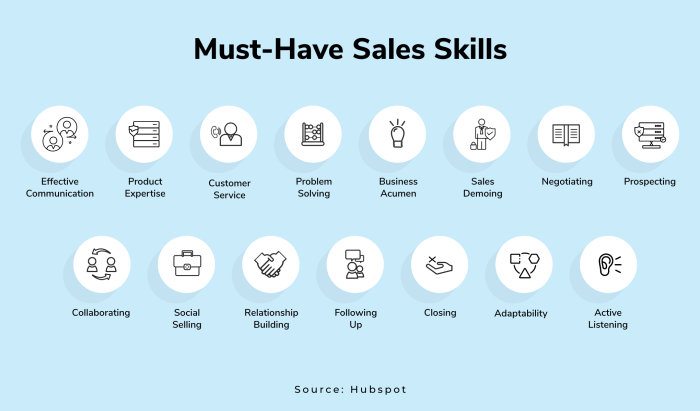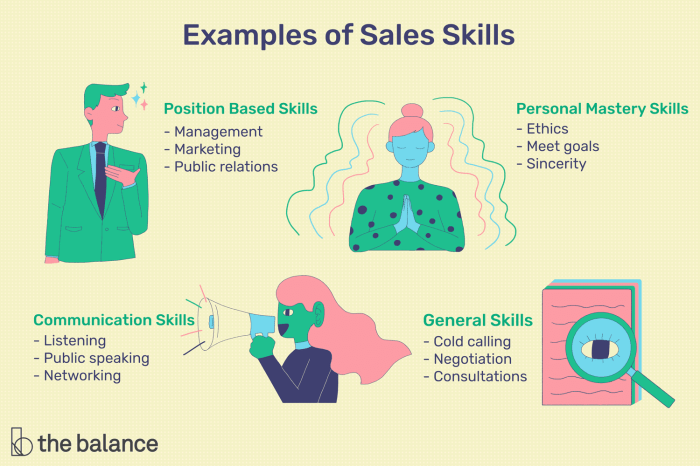Developing Sales Skills sets the stage for this enthralling narrative, offering readers a glimpse into a story that is rich in detail with American high school hip style and brimming with originality from the outset.
As we delve deeper, we uncover the key components that make up successful sales strategies and the essential skills needed to thrive in the competitive business landscape.
Importance of Developing Sales Skills

In today’s competitive business environment, having strong sales skills is essential for success. These skills not only help in driving revenue growth but also play a crucial role in building and maintaining strong relationships with customers.
Impact on Revenue Growth
- Effective sales skills can lead to increased sales numbers, resulting in higher revenue for the business.
- Sales professionals with strong negotiation skills can secure better deals and higher prices, ultimately contributing to revenue growth.
- Building rapport with customers through effective communication can lead to repeat business and referrals, further boosting sales and revenue.
Enhancing Customer Relationships
- Developing sales skills such as active listening and empathy can help sales professionals better understand customer needs and provide tailored solutions.
- By delivering exceptional customer service and demonstrating product knowledge, sales professionals can build trust and loyalty with customers.
- Effective sales skills can also help in handling customer objections and concerns, turning them into opportunities to strengthen the relationship.
Key Sales Skills to Develop

Developing key sales skills is essential for success in the competitive world of sales. Here are some of the most important skills to focus on:
Active Listening
Active listening is a crucial skill in sales as it allows you to truly understand the needs and concerns of your customers. By listening attentively to their requirements, you can tailor your pitch to meet their specific needs and build a stronger relationship.
Communication
Effective communication is vital in sales to convey your message clearly and persuasively. Being able to articulate the benefits of your product or service in a compelling way can help you close more deals and build trust with your customers.
Negotiation
Negotiation skills are key in sales to navigate pricing discussions and reach mutually beneficial agreements with customers. Being able to find common ground and handle objections effectively can help you close deals successfully.
Empathy in Sales Interactions
Empathy plays a crucial role in sales interactions by allowing you to understand and relate to the emotions and perspectives of your customers. By showing empathy, you can build rapport, establish trust, and create a more positive buying experience for your customers.
Product Knowledge
Having a deep understanding of your product or service is essential in sales to convey its value and benefits to customers effectively. By being knowledgeable about what you’re selling, you can address customer questions confidently and position your offering as the best solution to their needs.
Strategies for Improving Sales Skills
When it comes to boosting your sales game, there are a few key strategies you can implement to enhance your skills and close more deals. From handling objections like a pro to tailoring your pitches to meet the unique needs of each customer, here are some tips to help you level up your sales skills.
Overcoming Objections During Sales Conversations
During sales conversations, objections from potential customers are inevitable. However, the way you handle these objections can make all the difference in whether or not you close the deal. Here are some techniques to help you navigate objections smoothly:
- Listen actively to understand the customer’s concerns.
- Acknowledge the objection without dismissing it.
- Provide relevant information or examples to address the objection.
- Ask open-ended questions to uncover the root of the objection.
- Stay positive and maintain a solutions-oriented mindset.
Personalizing Sales Pitches to Different Customer Needs
Not all customers are the same, and a one-size-fits-all sales pitch is unlikely to resonate with everyone. To increase your chances of success, it’s crucial to tailor your sales pitches to the specific needs and preferences of each customer. Here’s how you can personalize your pitches effectively:
- Research your customer’s business or personal background to understand their pain points.
- Highlight how your product or service can address their specific needs or challenges.
- Use language and examples that resonate with the customer’s industry or interests.
- Ask probing questions to uncover the customer’s priorities and objectives.
- Adapt your pitch in real-time based on the customer’s reactions and feedback.
Significance of Continuous Learning and Practice
Improving your sales skills is an ongoing process that requires dedication and continuous learning. By staying curious, seeking feedback, and practicing your techniques regularly, you can sharpen your sales acumen and stay ahead of the competition. Here’s why continuous learning and practice are essential for honing your sales skills:
-
“The more you practice, the better you get. The better you get, the more you practice.”
- Learning new sales strategies and approaches can help you adapt to changing market dynamics.
- Practicing objection-handling techniques can boost your confidence and ability to think on your feet.
- Feedback from mentors or peers can provide valuable insights for improvement.
- Regularly updating your skills ensures that you remain competitive and relevant in the sales industry.
Utilizing Technology in Sales Skill Development: Developing Sales Skills
In today’s digital age, technology plays a crucial role in enhancing sales skills and effectiveness. Let’s explore how various technological tools can be utilized to improve sales performance.
CRM Systems for Sales Effectiveness
Customer Relationship Management (CRM) systems are powerful tools that can help sales professionals manage their interactions with customers more effectively. These platforms allow salespeople to track customer preferences, purchase history, and communication interactions, enabling them to tailor their sales approach to meet the needs of each individual customer.
- CRM systems can provide valuable insights into customer behavior, helping sales professionals identify patterns and trends that can inform their sales strategies.
- By centralizing customer data and communication history, CRM systems enable sales teams to work more efficiently and collaboratively, leading to improved customer relationships and increased sales.
- Automated features in CRM systems, such as email reminders and follow-up prompts, can help sales professionals stay organized and on top of their sales pipeline.
Data Analytics for Understanding Customer Behavior
Data analytics tools play a crucial role in understanding customer behavior and preferences, allowing sales professionals to make data-driven decisions and personalize their sales approach.
- By analyzing customer data, sales professionals can identify customer trends, preferences, and pain points, enabling them to tailor their sales pitch and offerings to meet specific customer needs.
- Data analytics can also help sales teams identify high-potential leads, prioritize sales opportunities, and optimize their sales strategy for maximum effectiveness.
- Utilizing predictive analytics, sales professionals can forecast customer behavior and anticipate their needs, allowing them to proactively address customer concerns and drive sales growth.
Utilizing Social Media Platforms for Sales Prospecting, Developing Sales Skills
Social media platforms have become valuable tools for sales prospecting, allowing sales professionals to connect with potential customers, build relationships, and generate leads.
- By leveraging social media platforms like LinkedIn, Twitter, and Facebook, sales professionals can identify and engage with decision-makers in target industries and companies.
- Engaging with customers on social media allows sales professionals to gather valuable insights into customer preferences, interests, and pain points, enabling them to tailor their sales pitch and offerings accordingly.
- Social media platforms also provide a platform for sharing content, building brand awareness, and establishing thought leadership in the industry, helping sales professionals attract and retain customers.
